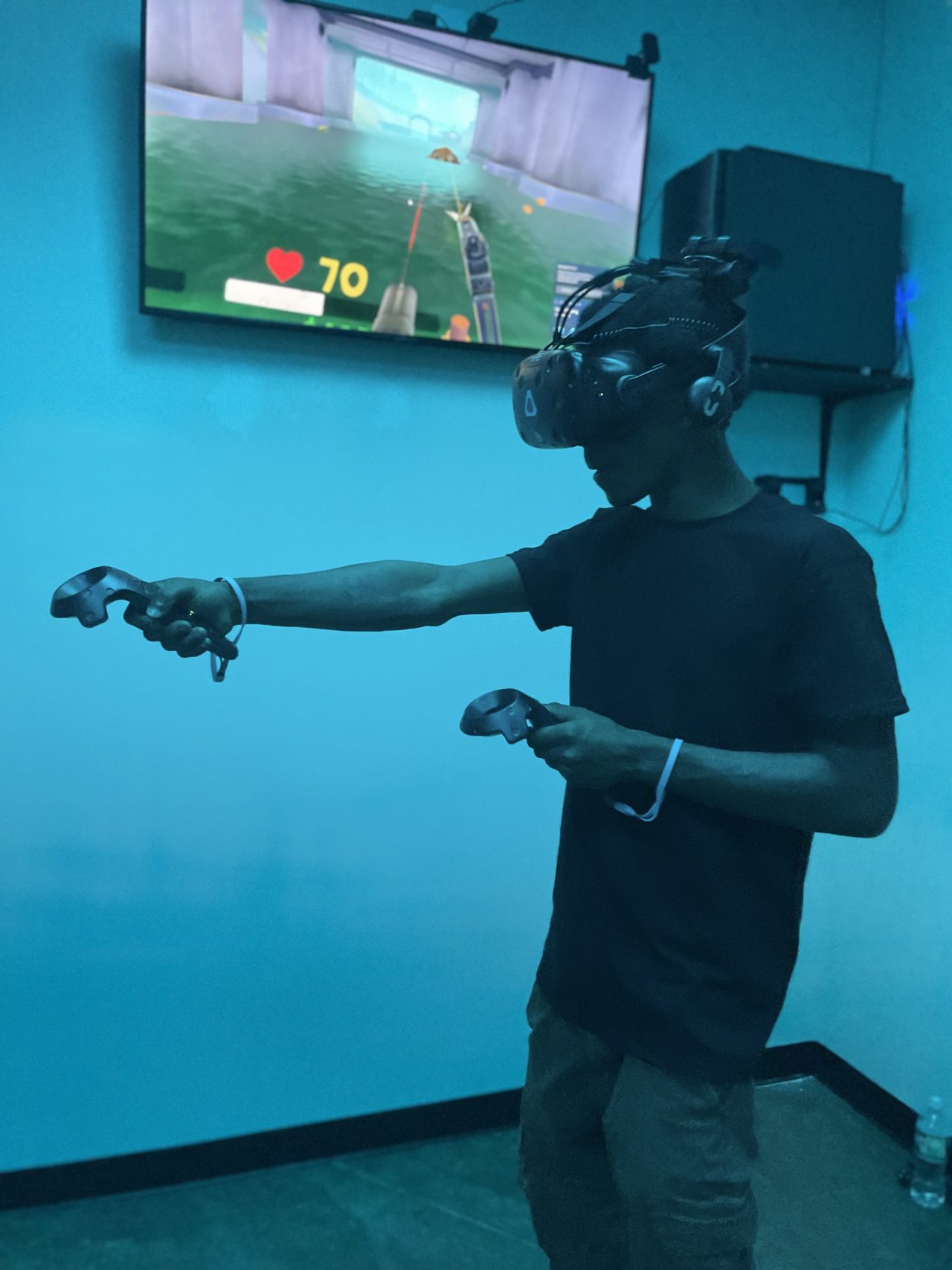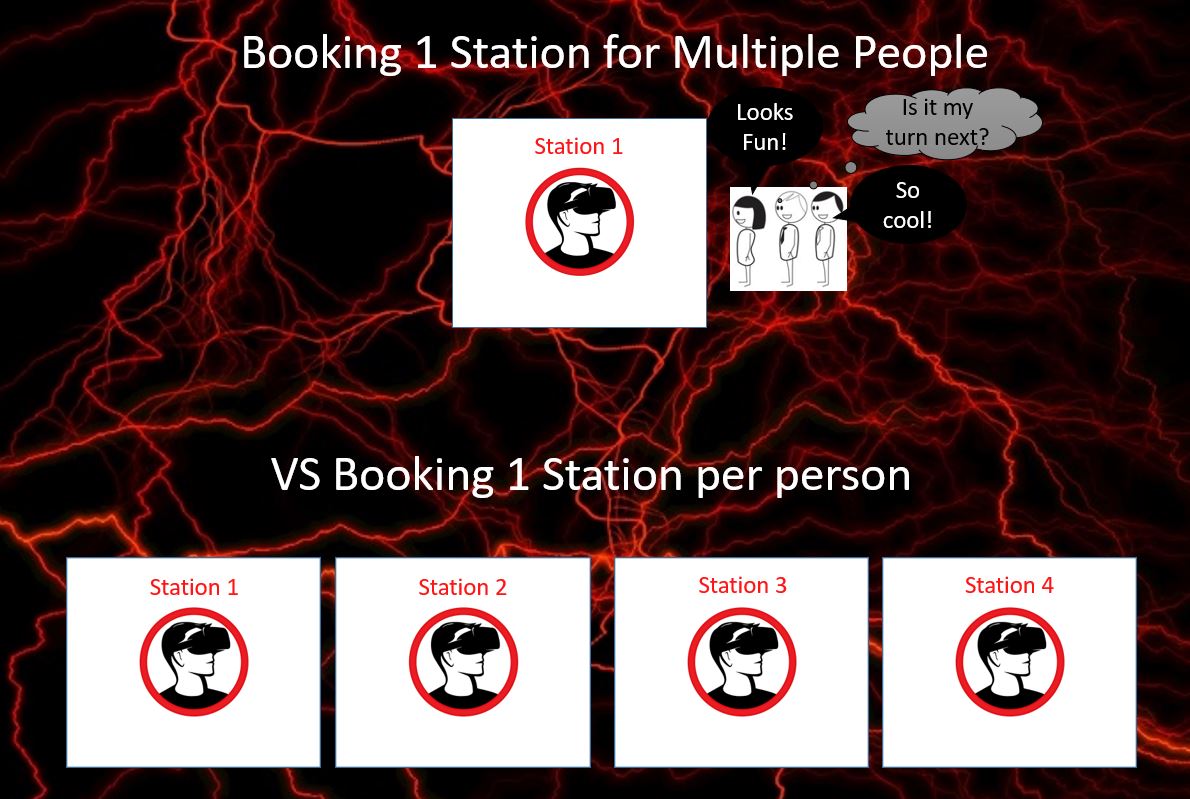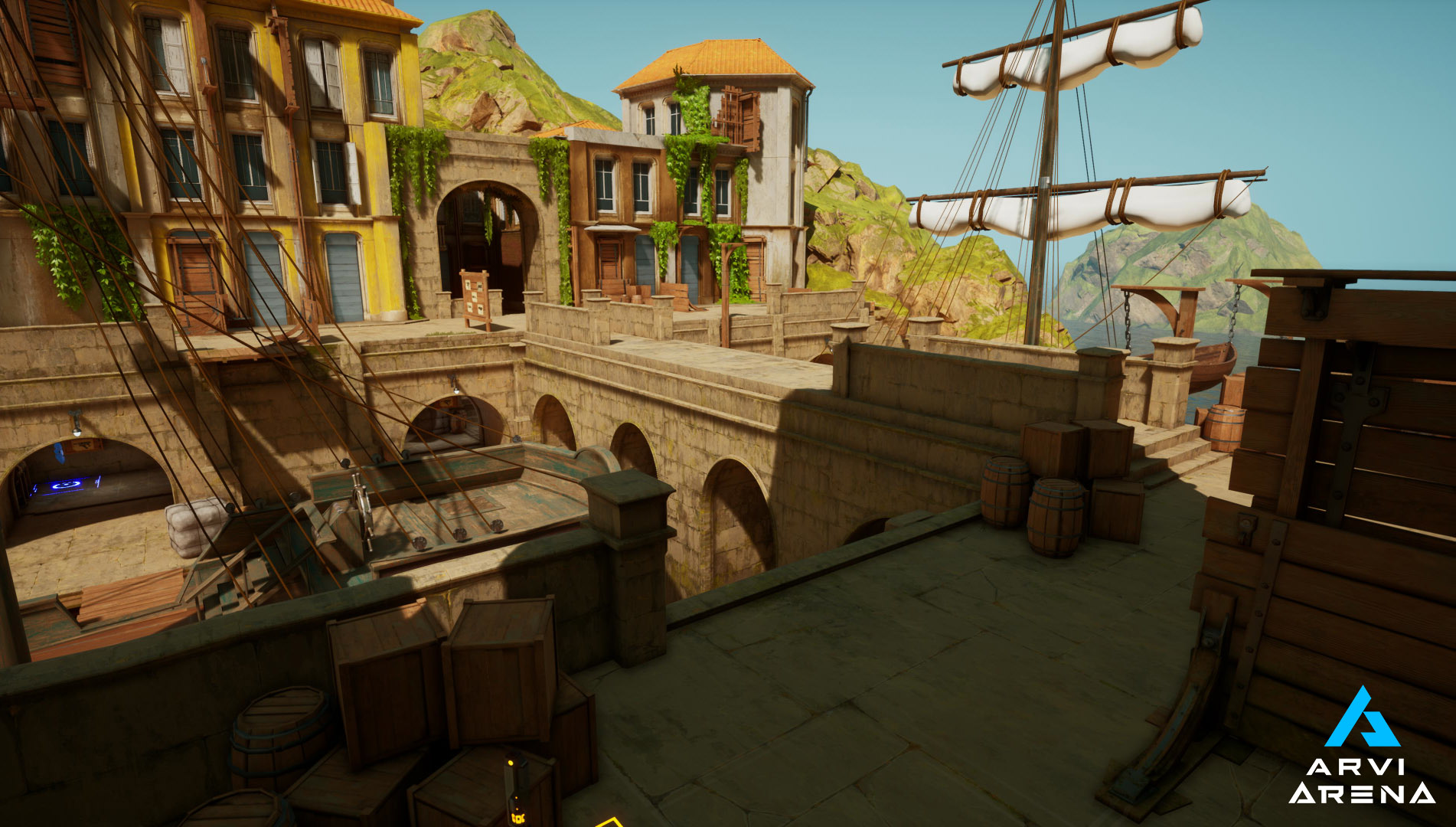Fixation VR - Getting Caught In Virtual Worlds
Have you ever found yourself completely caught up in something, where your thoughts just keep going back to that one thing? It's a pretty common feeling, that kind of intense focus. Maybe it's a new hobby, a really interesting idea, or even just a song that gets stuck in your head. When we think about experiences that can truly grab our attention, virtual reality, or VR, certainly stands out. It has a way of pulling you right into another place, making you feel like you are truly there, which, you know, can be quite something.
This unique ability of VR to put you inside a different setting means it can create some very strong feelings and moments. Think about it: you put on a headset, and suddenly you are not in your living room anymore. You might be on top of a skyscraper, or perhaps in a world filled with fruit that needs slicing. This kind of immediate immersion can really make your mind zero in on what's happening around you in that simulated space. It's almost like your brain gets a new temporary home, and it starts to feel very real.
When we talk about something called "fixation," especially in how our minds work, it's about a deep, lasting kind of focus or a strong pull towards an idea or a thing. It's like a mental spotlight that just stays on one spot, not wanting to move. So, when we put these two ideas together, "fixation" and "VR," it starts to get quite interesting. What does it mean for our thoughts and feelings when we spend time in these incredibly real-feeling virtual spaces? It's a question worth looking into, as a matter of fact.
Table of Contents
- What Is Fixation, Anyway?
- How Fixation VR Can Captivate Us
- Can Fixation VR Experiences Become Too Intense?
- What Does Fixation VR Feel Like in a Game?
- The Early Days of Fixation VR Experiences
- Different Types of Fixation VR Worlds
- How Does Fixation VR Affect Our Minds?
- Using Fixation VR for New Thought Patterns
What Is Fixation, Anyway?
So, you know, when we talk about "fixation" in the way our minds work, it's a little more than just being interested in something. It's like getting truly stuck on an idea, a feeling, or a wish. This can happen, basically, because of things that weren't quite sorted out when a person was growing up. It's kind of like a mental loop that just keeps playing. It can lead to doing things over and over again, things that are, you know, a bit obsessive. It's not always about something bad; sometimes it's just a really, really strong focus on one thing that becomes hard to shift away from. This state of being unable to stop thinking about something or someone, or an unnaturally strong connection to it, is what we are talking about here. It's a persistent concentration of mental energy on particular things or ideas, which, in some respects, can be very powerful.
At its very core, a fixation is an intense and often very strong preoccupation with a certain idea, an item, or another person. It's like a bright light in your mind that just refuses to move, always shining on that one spot. This kind of deep focus can appear at any point in life and, sometimes, it can make it harder for us to adjust or simply move on from things. It's a symptom that can show up in different ways across various mental experiences, each with its own special qualities and reasons for being there. So, when we consider how captivating virtual reality can be, it makes you wonder how these deep mental states might connect with such absorbing digital spaces. It's a thought, isn't it?
How Fixation VR Can Captivate Us
When you step into a VR experience, it's like your senses are suddenly given a whole new world to explore. This can create a kind of immediate and deep focus, which is a bit like a fixation. Take, for example, the intense action of a game like Ragnarock VR. You are a Viking captain, playing in a ship race, and you use two hammers to crush runes coming at you. That kind of intense, rhythmic action, where you are constantly hitting targets, can really make your mind lock onto the task. You are so busy hitting those runes that, you know, everything else just fades away. It’s a very direct way for your attention to be held, and it is, in a way, a form of very strong engagement.
Consider Fruit Ninja VR, too. It takes that squishy, satisfying gameplay of slicing fruit and puts you right inside it. Players of all ages and skill levels can enjoy it. You step into that fruit ninja world and just start tackling all the fruit. The simple, repetitive, yet satisfying action of slicing can be very absorbing. It's almost like your hands are doing the work, but your mind is completely present, focused on each piece of fruit flying by. This kind of focused activity, where your actions directly affect the virtual world, can create a very compelling loop, making it hard to stop. It’s pretty much an experience that keeps you coming back, isn't it?
Can Fixation VR Experiences Become Too Intense?
Some VR experiences are made to be very, very intense, and this can lead to a kind of deep immersion that borders on a fixation. Think about Help Wanted VR: Five Nights at Freddy’s. Here, your goal is to survive terrifying encounters with your favorite killer characters. The constant tension, the jump scares, the need to stay alert and react quickly – all of this can really make your mind zero in on the survival aspect. You're trying to stay alive, and every sound, every shadow, becomes critically important. This level of focus, you know, can be very consuming, making it hard to think about anything else while you are playing. It’s like your whole being is just trying to make it through the night.
Then there's Superhot VR, which mixes careful planning with, you know, a bit of wild action. It's a shooter where time only moves when you do. This unique rule means you have to be incredibly focused on your movements and reactions. Every step, every shot, is a conscious decision. The way it blurs the lines between being careful and just letting loose, it creates a very specific kind of mental state. You are constantly thinking, planning, and reacting, which can be very, very absorbing. This kind of deep, active participation can certainly lead to a strong, almost obsessive focus on the game's mechanics and goals, pretty much making you feel like you are the one pulling all the strings.
What Does Fixation VR Feel Like in a Game?
When you're truly caught up in a VR game, the feeling of fixation can be very real. Take a dynamic VR Western shooter, for instance. It completely puts players into the feeling of a weird, wild west. As you step into the tangled storyline, you will come across many different things. The constant need to react, to shoot, to figure out what’s happening next, it all keeps your mind very busy and very focused. You are not just playing a game; you are, you know, living it, at least for a little while. This can create a very strong sense of purpose within the game, making it hard to pull yourself away. It’s like your brain is fully engaged in that specific setting, and it tends to be very compelling.
Another example is Arizona Sunshine. When it's running on a powerful computer, it brings a lot of realness to VR gaming, with zombie body parts flying around and things breaking apart. You are fighting for your life in a world full of zombies. The constant threat, the need to aim carefully, and the sheer number of enemies can really make your mind concentrate. You are authorized to take down the enemy at any means possible, and that directive really sticks with you. This kind of intense, survival-focused gameplay can create a very strong mental hold, making you feel like your very existence depends on your actions in the game. It's pretty much a situation where your mind is utterly fixed on the task at hand.
The Early Days of Fixation VR Experiences
The idea of fixation in VR isn't new, not really. Back in 2017, there was a story about "Fixation VR." It talked about people experiencing VR for the very first time in Manhattan. One person, Joan, had her first experience walking across a tightrope from skyscraper to skyscraper in the New York City skyline. That kind of experience, where your body feels like it's really there, even though you know it's not, can be incredibly powerful. It forces a kind of mental focus, where you are, you know, completely absorbed in the feeling of height and balance. It's a pretty good example of how VR can create an immediate and very strong mental connection, almost like a temporary fixation on that specific feeling.
For people who had never been to a VR arcade before, these early experiences were a way to see the reality they were about to get into. The first time in virtual reality, it’s a big deal. You put on the headset, and suddenly you're in a completely different place. This initial shock and wonder can create a very deep impression, making your mind, in a way, fixate on the newness and the possibilities. It's not just about playing a game; it's about experiencing something truly different, something that, you know, sticks with you. This early exposure really showed how VR could capture a person's attention in a way that traditional screens just couldn't, pretty much creating a lasting memory.
Different Types of Fixation VR Worlds
VR offers so many different worlds, and each one can create its own kind of mental pull, a sort of fixation on its unique rules and settings. Think about the zombie crisis scenarios. As a zombie crisis broke out around the world, you play one of the warriors of S.E.A.T (Special Event Action Team) to fight the zombies everywhere. Or consider Propagation VR, which combines survival horror with wave shooting. It will get your heart pumping as you try to survive a zombie apocalypse, armed only with your guns. These kinds of experiences force you to stay alert, to constantly look for threats, and to manage your resources. Your mind becomes very, very focused on survival, which is a strong form of, you know, mental engagement. It’s like your brain is in full problem-solving mode, and it’s hard to switch off.
Then there are worlds that are more about puzzles and stories. Imagine breaking the Queen of Hearts' evil time spell, or drinking a shrinking potion to follow the white rabbit through twisted mazes. These types of VR escape rooms, where you get up to 60 minutes to solve your chosen room, and hints are available, they require a different kind of mental focus. You're trying to figure things out, to connect clues, and to move forward in the story. This problem-solving aspect can be very absorbing, creating a kind of mental hook. It's not about quick reactions but about sustained thought and observation, which, you know, can be just as powerful in holding your attention. It's pretty much a mental workout that keeps you locked in.
How Does Fixation VR Affect Our Minds?
When we spend time in these virtual worlds, the intense focus that VR can create might, in a way, resemble what we call a psychological fixation. It's not necessarily a bad thing, but it's about how deeply our minds can get caught up. For example, in a game like Pistol Whip VR, which is a physical shooter fueled by dynamic music tracks, dream-like visuals, and gunplay that's easy to pick up but hard to master, your mind and body are working together. Inspired by iconic action movies, the only thing that goes harder than you is the beat. This kind of rhythmic, action-packed experience can make your brain really lock into the flow, almost like a trance. You're moving, shooting, and reacting to the music, and your mind is completely dedicated to that sequence of actions. It’s a very specific kind of mental state, that, you know, can feel very absorbing.
Consider the story mode in a game where your mission takes place in a post-outbreak New York, a city turned into an isolated quarantine zone. This kind of narrative-driven experience, where you're trying to survive and complete objectives, can create a strong sense of purpose. Your mind becomes very, very invested in the story and its outcomes. You're constantly thinking about your next move, about the dangers, and about how to achieve your goals. This sustained mental effort, this commitment to the virtual situation, it's pretty much a form of deep mental engagement. It shows how VR can create a kind of mental spotlight that stays fixed on the virtual world's problems and challenges, keeping you completely engrossed.
Using Fixation VR for New Thought Patterns
Interestingly, the very nature of fixation in psychology suggests that a common way to help is to replace thoughts that are not wanted with healthier ways of thinking. This idea, in some respects, can be connected to how we use VR. If a person gets stuck on a certain idea, feeling, or wish, often because of things that weren't resolved earlier in life, VR could, in a way, offer a new focus. It's not a direct treatment, of course, but the ability of VR to create new, absorbing experiences means it could potentially offer a different kind of mental engagement. For example, being in an amazing sanctuary populated by animals, which appears in front of you during a walk in a park where you discover a portal, that kind of peaceful, calming experience could provide a very different mental focus. It’s like your mind is given a new, positive place to rest its attention, which, you know, could be quite helpful.
The intense focus that VR demands, whether it's solving puzzles in an escape room or fighting zombies, means that your mind is fully occupied with the virtual task. This occupation, this temporary mental "fixation" on the VR world, could potentially offer a break from other, less helpful thought patterns. It's like giving your brain a different problem to solve, a different world to be in, which, you know, can be a good distraction. While it's not a medical solution, the immersive nature of VR means it can offer a powerful way to direct attention and create new experiences. It's pretty much a tool that can provide a new kind of mental workout, one that keeps your mind busy and engaged in a different way.

HOW TO VR | Fixation VR

HOW TO VR - Fixation VR

ARVI Arena VR | Fixation VR